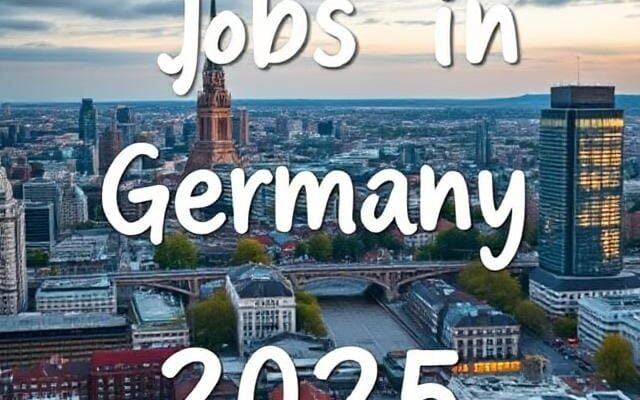Jobs in Germany 2025: Your Guide to Upcoming Opportunities
Are you an Indian professional with aspirations for a career abroad? The German job market is undergoing rapid transformation, opening up promising avenues for international talent. As Europe’s largest economy expands, it confronts significant workforce shortages. These gaps present an opportunity for qualified overseas candidates to contribute.
Germany’s aging population and the digital revolution have created a synergy of career opportunities across various sectors. For Indian professionals with specialized skills, this is a unique chance to enhance their careers while experiencing life in a vibrant European nation.

The future jobs in Germany encompass a range of fields, including technology, healthcare, engineering, and sustainability. What makes this period particularly opportune is Germany’s proactive stance on international recruitment. The country has streamlined visa processes and offers support for integrating qualified candidates.
This comprehensive guide delves into the essential aspects of work in Germany 2025. It covers in-demand skills, growth sectors, and practical advice on immigration requirements and cultural adaptation. Whether you’re an experienced professional or just starting out, we aim to guide you through your journey to professional success in Germany.
Key Takeaways
- Germany faces critical skilled labor shortages through 2025, creating opportunities for qualified Indian professionals
- Technology, healthcare, engineering and sustainability sectors show the strongest growth potential
- New immigration pathways make relocation more accessible for qualified candidates
- Language skills significantly enhance employment prospects and integration
- Average salaries in Germany are 30-40% higher than equivalent positions in India
- Cultural adaptation plays a crucial role in long-term professional success
The German Job Market: Current Landscape and Future Trends
The German job market is undergoing a significant transformation, driven by economic and demographic factors. Despite global uncertainties, Germany remains Europe’s largest economy, with a strong industrial base and a growing service sector. This dual strength ensures a resilient employment market, attracting international talent.
Germany’s unemployment rate has remained relatively low, around 5.5% in recent years. This stability, coupled with strong labor protections and competitive wages, makes it an attractive destination for skilled professionals from countries like India. However, beneath this surface stability lies a market in transition.
The traditional manufacturing powerhouse is rapidly evolving into a knowledge and technology-driven economy. This shift is creating new career pathways while transforming existing industries. For international job seekers, understanding these labor market trends in Germany is crucial for positioning themselves advantageously in this changing landscape.
Economic Outlook for Germany Through 2025
Economic forecasts for Germany through 2025 show resilience despite global challenges. The German economy is projected to maintain moderate but stable growth, with particular strength in several key sectors. The German economic forecast indicates annual GDP growth between 1.2% and 1.8% through 2025, outperforming several other European economies.

High-tech industries, renewable energy, and healthcare are expected to be the primary growth drivers. The digital transformation of Germany’s industrial base—often called Industry 4.0—is creating substantial demand for IT specialists, data scientists, and automation experts. Meanwhile, Germany’s commitment to climate neutrality is fueling rapid expansion in green technology sectors.
Impact of Demographic Changes on Employment
Germany faces a significant demographic shift that is reshaping its labor market fundamentals. With one of the world’s oldest populations and a persistently low birth rate, the country is experiencing a natural decline in its working-age population. Current projections suggest Germany could face a shortage of up to 5 million skilled workers by 2030.
This demographic shift in Germany creates a substantial opportunity for qualified international professionals. German employers and policymakers increasingly recognize that immigration is essential to maintaining economic growth and supporting social systems. Industries most affected by these shortages include healthcare, IT, engineering, and skilled trades.
For Indian professionals with relevant qualifications, this demographic dividend means more accessible entry into the German job market and potentially faster career advancement than in previous decades.
Regional Hotspots for Job Growth
Germany’s economic landscape varies significantly by region, with distinct job growth regions offering different opportunities. Berlin has emerged as Europe’s startup capital, with a vibrant tech ecosystem that attracts digital talent from around the world. The city added over 30,000 new jobs in technology sectors alone during the past three years.
Southern states like Bavaria and Baden-Württemberg remain manufacturing powerhouses, home to global giants like BMW, Siemens, and Bosch. These regions offer excellent opportunities in engineering, automotive technology, and advanced manufacturing with some of Germany’s highest average salaries.
Emerging hotspots include Leipzig and Dresden in eastern Germany, where lower costs and increasing investment are creating new opportunities. Hamburg’s port-driven economy and Frankfurt’s financial sector also continue to generate substantial employment for specialized professionals. Understanding these regional differences can help international job seekers target their search more strategically.
Jobs in Germany 2025: Your Guide to Upcoming Opportunities by Sector
Germany’s economy is undergoing significant transformations, setting the stage for a plethora of career opportunities by 2025. The nation’s strategic investments, demographic shifts, and technological advancements are creating a plethora of specialized roles across various sectors. For Indian professionals contemplating a move to Germany, identifying the sectors with the most growth potential is crucial for strategic career positioning.
Technology and Digital Transformation
Germany’s digital transformation is fueling a surge in tech jobs nationwide. The Industrie 4.0 initiative is driving demand for experts in artificial intelligence, machine learning, and data science. As digital threats escalate, cybersecurity specialists are in high demand.
Cloud computing architects and developers with IoT expertise are highly sought after by German manufacturing firms as they digitize their operations. Berlin, Munich, and Hamburg have emerged as tech hubs, attracting startups and established companies with competitive salaries and benefits.

Healthcare and Life Sciences
Germany’s aging population and its status as a global pharmaceutical leader are creating a wealth of healthcare careers by 2025. Medical professionals, including doctors and specialized nurses, will find increasing opportunities, especially those with geriatric care experience.
The biotech and pharmaceutical sectors are expanding, with a particular demand for researchers and clinical trial specialists. Medical technology companies are seeking engineers to develop innovative devices and diagnostic tools. For Indian healthcare professionals, Germany offers competitive compensation and advanced professional development opportunities.
Regions like Bavaria and Baden-Württemberg host thriving healthcare clusters where international expertise is highly valued.
Green Energy and Sustainability
Germany’s commitment to climate neutrality by 2045 is driving explosive growth in green energy jobs. Engineers specializing in wind, solar, and hydrogen technologies are in high demand. Environmental consultants who can help businesses reduce their carbon footprint are becoming essential across all industries.
Sustainable construction experts and energy efficiency specialists will find numerous opportunities as Germany retrofits existing buildings and implements stricter standards for new developments. The circular economy is creating roles in waste management innovation and sustainable supply chain optimization.
Engineering and Manufacturing
Germany’s traditional engineering strengths continue to evolve, offering exciting engineering opportunities for qualified professionals. The automotive sector is undergoing a revolution as it shifts toward electric mobility, requiring specialists in battery technology and lightweight materials. Precision engineering remains crucial across industries, from aerospace to medical devices.
Advanced manufacturing processes, including 3D printing and smart factory implementation, are generating roles for process engineers and automation specialists. Indian engineers with experience in these areas will find their skills particularly valued by German employers looking to maintain their global competitive edge.
In-Demand Skills for the German Workforce of Tomorrow
To excel in Germany’s workforce by 2025, Indian professionals must acquire a strategic skillset. This skillset must align with the country’s economic trajectory and employer expectations. As Germany advances in digital transformation and sustainable development, the demand for specialized talents is rapidly increasing. Understanding which skills are needed for German jobs will provide a competitive advantage in this sophisticated market.
Technical Expertise and Qualifications
German employers highly value formal qualifications and specialized technical knowledge. Engineering degrees, especially in mechanical, electrical, and software disciplines, are highly sought after. IT professionals benefit from certifications in cloud computing, cybersecurity, and data science, enhancing their employability.
The German dual education system, combining theoretical learning with practical application, shapes employer expectations. Highlighting hands-on experience or industry internships on your resume is crucial. Technical qualifications in Germany often require verification through the Recognition Act (Anerkennungsgesetz), ensuring they meet German standards.
Pursuing German-recognized certifications in your field can complement your Indian qualifications. Organizations like TÜV and DEKRA offer internationally respected technical certifications. These certifications can significantly boost your profile in specialized sectors like automotive and manufacturing.
Language Requirements and Communication Skills
While many multinational companies operate in English, mastering German language requirements opens more career opportunities. Employers generally expect at least B1 level German (intermediate) for most professional positions. Technical roles may accept lower proficiency, while customer-facing positions require B2 (upper intermediate) or higher.
The healthcare sector, public administration, and education have stricter language demands, often requiring C1 (advanced) certification. Many companies offer language training as part of their onboarding process. Arriving with basic German skills demonstrates commitment to integration.
Understanding German communication styles is crucial. Germans value direct, precise communication with minimal small talk in professional settings. Email correspondence is formal, and meetings follow structured agendas with clear outcomes.
Soft Skills Valued by German Employers
The soft skills in German workplace culture often differ from those prioritized in India. Punctuality is not just appreciated—it’s expected. Meetings start exactly on time, and deadlines are treated as firm commitments rather than flexible targets.
German work culture values thoroughness over speed. Delivering precise, error-free work is more important than rapid completion. This “quality-first” mindset extends to planning and organization, with German businesses preferring methodical approaches and clear processes.
Self-reliance and independent problem-solving are highly regarded. While teamwork matters, German employers expect professionals to manage their responsibilities with minimal supervision. Demonstrating these qualities during interviews through specific examples from your work history can significantly strengthen your candidacy for positions in Germany’s evolving job market.
Immigration Pathways for Indian Professionals
Germany’s immigration system has become more accessible for qualified Indian professionals, thanks to recent policy changes. The country has recognized the value of international talent, creating straightforward pathways for skilled workers. For Indian professionals considering a move to Germany, understanding these options is crucial for a smooth transition.
Visa Options and Work Permits
Germany offers various visa categories for different professional situations. The EU Blue Card Germany is the premier option for highly qualified professionals with university degrees and job offers above €56,800 annually (or €44,304 for shortage occupations like IT and engineering).
The Job Seeker Visa allows Indians to stay in Germany for up to six months while searching for employment. This visa requires proof of qualifications and sufficient funds to support yourself during your stay.
The Skilled Immigration Act has expanded opportunities for those with vocational training, not just university graduates. This represents a significant shift in Germany’s approach to international recruitment.
| Visa Type | Eligibility Requirements | Processing Time | Cost (approx.) |
|---|---|---|---|
| EU Blue Card | University degree, job offer with minimum salary | 1-3 months | €110 |
| Job Seeker Visa | Degree, proof of funds, CV | 2-4 months | €75 |
| Work Visa | Job offer, recognized qualifications | 1-2 months | €75 |
Recognition of Indian Qualifications
Getting your Indian credentials recognized is often a mandatory step in the immigration process. The qualification recognition Germany process varies depending on your profession and the state where you plan to work.
For regulated professions like medicine, nursing, and engineering, formal recognition is required before you can practice. The process typically involves submitting your degree certificates, transcripts, and work experience documentation to the appropriate recognition authority.
The Anabin database can help you check if your Indian university degree is already recognized in Germany. If gaps are identified, you may need to complete additional training or examinations to achieve full equivalence.
Recent Policy Changes Affecting Foreign Workers
Germany’s skilled immigration landscape has seen significant improvements recently. The Skilled Immigration Act of 2020 removed the requirement for employers to prove they couldn’t find EU citizens before hiring non-EU nationals.
Salary thresholds for the EU Blue Card have been adjusted to make this option more accessible, particularly in shortage occupations. The path to permanent residency has also been shortened for skilled workers, now possible after just four years.
Additionally, the recognition process for foreign qualifications has been streamlined, with faster processing times and more transparent procedures. These changes reflect Germany’s commitment to attracting global talent, creating unprecedented opportunities for Indian professionals seeking international career growth.
Navigating the German Work Culture and Job Search
Understanding the German job market requires knowledge of local work culture, application processes, and networking strategies. German professional environments have distinct expectations that differ from Indian norms. Familiarity with these differences is crucial for effective positioning and avoiding common pitfalls during your job search.
Creating a German-Style Resume and Cover Letter
The German Lebenslauf (CV) adheres to a specific format, distinct from Indian resumes. German employers favor a structured, chronological format with precise dates, unlike the narrative style prevalent in India.
Your German CV should include a professional photo and be concise, limited to two pages. Include personal details such as date of birth and nationality. The Anschreiben (cover letter) must be formal, concise, and tailored to each position.
- Use reverse chronological order for work experience
- Include specific achievements with measurable results
- Avoid subjective self-assessment or flowery language
Interview Expectations and Cultural Differences
German job interviews are more formal and structured than those in India. Punctuality is paramount—arriving late can significantly impact your chances. German interviewers value directness and precision in your responses.
Prepare to provide specific examples rather than general statements about your skills. Modesty is appreciated, so confidently present your achievements without exaggeration or self-promotion.
Technical questions often dominate interviews, especially in engineering and IT roles. Expect thorough testing of your claimed expertise and qualifications.
Networking and Job Search Platforms
Networking is vital in the German job market, with many positions filled through personal connections. XING, the German equivalent of LinkedIn, is crucial for professional networking.
Specialized platforms offer better results than general job boards for online job searches:
- StepStone and Indeed Germany for general positions
- Academics.de for research and academic roles
- Make-it-in-Germany.com for international professionals
Industry-specific associations and professional meetups provide access to the “hidden job market.” Attending trade fairs relevant to your field can yield valuable connections.
Salary Expectations and Cost of Living
German salary structures vary by industry, location, and experience level. The average annual gross salary ranges from €45,000 to €65,000 for professionals with 3-5 years of experience in technical fields.
Approximately 40% of your gross salary will go toward taxes and mandatory social insurance contributions. Major cities like Munich and Frankfurt have significantly higher living costs than smaller cities like Leipzig or Dresden.
When negotiating compensation, research industry standards through resources like Glassdoor or Gehalt.de. Germans appreciate well-researched, realistic salary expectations rather than ambitious negotiation tactics common in other markets.
Your Roadmap to a Successful Career in Germany
Embarking on a career path in Germany necessitates a well-thought-out strategy, ideally initiated 12-18 months prior to relocation. Begin by evaluating your skills against the German market’s demands, pinpointing any skill gaps that require attention. Acquiring proficiency in the German language is crucial, as even a B1 level can substantially improve your employment prospects.
For a successful relocation, establish a detailed timeline with specific objectives. Start with the process of qualifying your credentials, which can take 3-6 months. Next, focus on targeted job applications, visa acquisition, and arranging practical aspects such as housing and insurance. Many Indian IT professionals achieve success by initially securing employment through Indian companies with German subsidiaries.
Integration in Germany transcends professional realms. Engage with local community groups, participate in language exchanges, and connect with established Indian networks in cities like Berlin, Munich, and Frankfurt. These connections offer invaluable support during your transition.
Professional development in Germany is a continuous process, even after securing your first job. German employers place a high value on ongoing learning, encouraging you to explore additional certification and industry-specific training. Most companies provide professional development programs that can propel your career forward and potentially lead to permanent residency.
Adapting to the German work culture requires patience. Embrace the directness of communication, the importance of punctuality, and the emphasis on work-life balance that define German professional environments. With dedication and perseverance, your career journey in Germany can yield substantial rewards, both professionally and personally.



